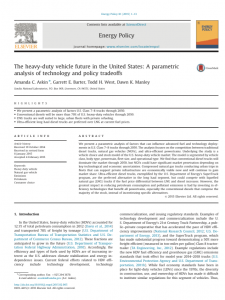Full Title: The heavy-duty vehicle future in the United States: A parametric analysis of technology and policy tradeoffs
Author(s): Amanda C. Askin, Garrett E. Barter, Todd H. West, & Dawn K. Manley
Publisher(s): Energy Policy
Publication Date: October 1, 2014
Full Text: Download Resource
Description (excerpt):
We present a parametric analysis of factors that can influence advanced fuel and technology deployments in U.S. Class 7–8 trucks through 2050. The analysis focuses on the competition between traditional diesel trucks, natural gas vehicles (NGVs), and ultra-efficient powertrains. Underlying the study is a vehicle choice and stock model of the U.S. heavy-duty vehicle market. The model is segmented by vehicle class, body type, powertrain, fleet size, and operational type. We find that conventional diesel trucks will dominate the market through 2050, but NGVs could have significant market penetration depending on key technological and economic uncertainties. Compressed natural gas trucks conducting urban trips in fleets that can support private infrastructure are economically viable now and will continue to gain market share. Ultra-efficient diesel trucks, exemplified by the U.S. Department of Energy’s SuperTruck program, are the preferred alternative in the long haul segment, but could compete with liquefied natural gas (LNG) trucks if the fuel price differential between LNG and diesel increases. However, the greatest impact in reducing petroleum consumption and pollutant emissions is had by investing in efficiency technologies that benefit all powertrains, especially the conventional diesels that comprise the majority of the stock, instead of incentivizing specific alternatives.
